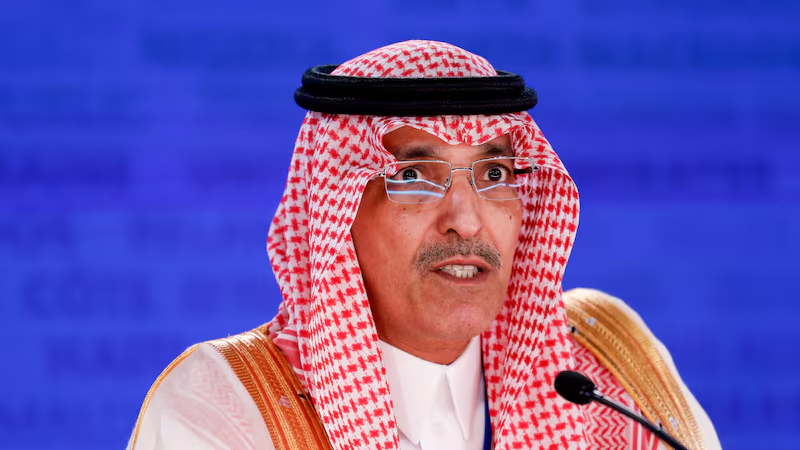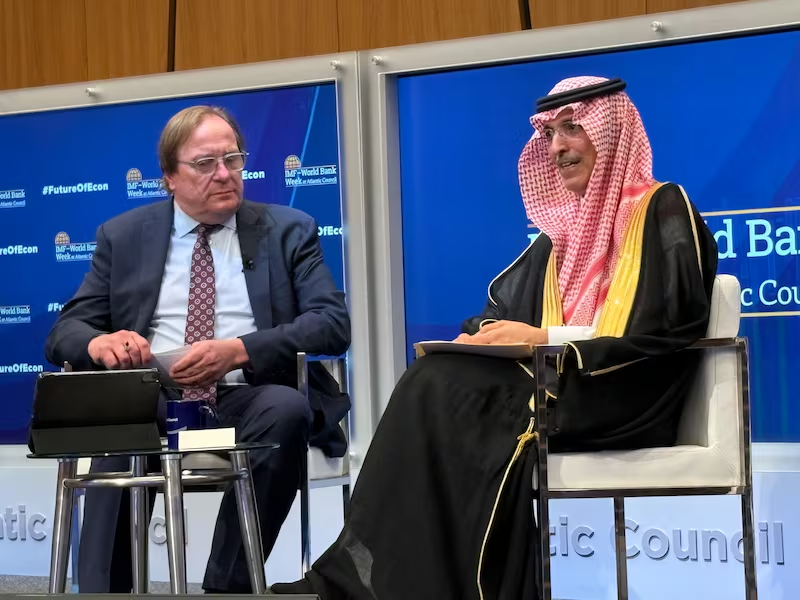Saudi Finance Minister sounds alarm on global debt

Oct 15, 2025
Mohammed Al Jadaan says challenge carries serious risks for global economic stability
Saudi Finance Minister Mohammed Al Jadaan on Tuesday warned against rising global debt levels.
Projections from the International Monetary Fund estimate the global public debt is projected to exceed 100 per cent of gross domestic product by 2029, led by advanced and emerging markets.
Mr Al Jadaan said the rising costs of servicing sovereign debt are placing pressures on advanced and developing economies.
“This challenge now includes countries in all income levels and debt carries a profound implications for global economic stability,” he told the Atlantic Council in Washington.
The IMF delivered a new warning about rising debt levels. In its Global Financial Stability Report, released earlier on Tuesday, the fund said debt continues to shift towards government sectors, with growing fiscal deficits pressuring bond markets.
The fund warned an abrupt yield increase potentially caused by debt sustainability concerns “could strain banks' balance sheets and pressure open-ended funds”.
Mr Al Jadaan, who chairs the International Monetary Finance Committee, said about half 7of the world lives in countries that spend more on servicing debt than on public utilities.
“This is very serious. This is indeed the fundamental misallocation of resources away from where they are needed most,” he said.
Mr Al Jadaan's remarks echo those of IMF Managing Director Kristalina Georgieva, who last week said rising debt increases interest payments, which constrains spending on other priorities and reduces countries' ability to absorb shocks.
"One casualty is advanced economies’ development assistance to the world’s neediest countries, which continues its regrettable decline,” Ms Georgieva said.
Speaking on the sidelines of the IMF and World Bank annual meetings, Mr Al Jadaan said countries should not simply try to reduce sovereign debt, but to channel it towards productive investments.
Mr Al Jadaan pointed Saudi Arabia's own investments through Vision 2030, its long-term project to diversify its economy away from oil.
“In Saudi Arabia, we have come together behind a clear, long-term vision to transform our economy and society,” he said.
Mr Al Jadaan said non-oil activity grew by 4.8 per cent in the first quarter this year, contributing about 56 per cent of Saudi Arabia's GDP.
He also spoke of the increasing female labour force in the kingdom. Data from the General Authority for Statistics showed the unemployment rate among Saudi women was 11.3 in the second quarter this year, while labour force participation was 34.5 per cent.
Mr Al Jadaan said Saudi Arabia's energy mix and young population give the kingdom an advantage in artificial intelligence, as a surge in AI infrastructure spending has driven market optimism. An analysis from UBS forecasts global AI spending to top $500 billion by 2026.
This market surge has led to recent questions about an AI bubble similar to the dot-com era of the late-1990s. While Mr Al Jadaan did not speculate on the potential of an AI bubble, he said it could lead to productivity gains but that it can also increase the divide between and within countries.
Global economy resilient
Mr Al Jadaan said the global economy has been resilient this year amid rising trade tension, echoing sentiments made by the IMF and global economic forecasters since US President Donald Trump's sweeping tariff announcement on April 2.
The fund raised its forecast for the global economy this year to 3.2 per cent – compared to 3.0 per cent in July – partly due to milder-than-expected tariff increases. While trade tension between the US and China have recently flared up again, Washington announced less harsh tariff rates on trading partners than in April. Other partners such as the EU and Canada have delayed retaliatory tariffs against the US.
Mr Al Jadaan said full fragmentation in global trade would lead to a lose-lose scenario, adding that trade discussions that took place since April have helped to improve the economic outlook.
“The Saudi position is we really believe in multilaterals. We believe in co-operation,” he said.
The IMFC chair also sought to calm fears about the futures of the World Bank and IMF, which came into question amid concerns that the US – the institutions' largest shareholder – might withdraw funding.
“The good news is actually the US is engaged. I can tell you first-hand as the chair of the IMFC, that [US Treasury Secretary Scott Bessent] has been tremendous supporter of the institution.”
Mr Bessent this year said the IMF and World Bank have strayed from their core missions by placing too much focus on issues such as gender and climate.
Mr Al Jadaan said he supports the call from the US for the two Bretton Woods institutions to refocus their efforts.
“Nobody will blame the IMF if they missed something to do with gender or even climate change, because there are other institutions that deal with this. But the IMF will be blamed if they missed an inflation, if they missed a serious debt crisis,” he said.

